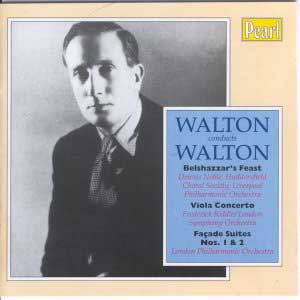The Walton centenary continues its prolific way among
the pages of the back catalogue. Quite understandably Pearl were not
to be left out of the drive that has also borne fruit from Decca, Sony,
EMI and BMG. The results in this case take us back to the 1930s and
1940s.
Walton's young Façade has so many
dimensions. The LPO are not at all strait-laced. This Façade
is boozy, slippery, jazzy, bluesy, sophisticated (in a pot palms and
Grand Hotel way), light, sleazy and atmospheric. Weill, Ravel and music
hall all jostle and collide. Walton, with the LPO's adepts, concentrates
on pace and sharp rhythmic control. Heresy, I know, but I am not an
admirer of Façade to my taste it evinces far too much
cleverness and an excess of emotional shallowness.
The Viola Concerto is not the strongest of the
concertos and in this recording you need to turn the volume well up
to extract the maximum 'juice' from Riddle's interpretation. Is it Riddle
or the recording or both? I came away from hearing this version with
a greater impression of mellowness than of bite. This version did however
open wide one, for me surprising, door and that involved the parallels
between the middle movement and Prokofiev's Violin Concerto No. 1. They
are close indeed.
Sensibly Pearl have placed the most substantial work
last. As a concert sequence this works well. We move with aplomb from
the light-edgy music of Façade to the Concerto's gently
singing manners to the jagged exuberance of Belshazzar's court.
This Belshazzar is a memorable interpretation
on many counts. The choral singing is big-sounding with great undulating
sheets of vocal luxury. Words are nevertheless shaped with distinctiveness
and can be made out in all but the wildest and woolliest moments. This
is just as well as Pearl do not print the words in their booklet. The
brass contribution is captured with strong accentuation; so much so
that in the opening bars there is distortion. Also startlingly large-sounding
is the anvil clang in the God of Iron. Then there is Dennis Noble who,
although suffering from a little of what is now seen as stilted affectation
in shaping vowels, has admirable breath control. Listen to the way he
rolls out: 'If I prefer not thee above my chief joys' all in one quiet
exhalation. 'Thus in Babylon' (tr24) is barked out with corrosive vituperation.
Listen to the way the choir punch out the words from 6.34. Walton drives
the Gadarenes before him in a Bacchanalian access of abandon in Then
sing, sing aloud and the great rollers of Huddersfield tone fold
and enfold each other. This is really exciting singing.
Walton makes Hickox, Willcocks and even Previn (EMI
- my favourite version) sound corpulently lumbering by comparison. Ormandy
(heard on a recent Essential Classics Sony) is superb but his choir
lacks the heft and stopping power of the Huddersfielders.
It is a pity that, given the age of the recording,
the richness and definition has to be mentally reconstituted by the
listener 'on the fly'. The sound is purged of spots, clicks and cracks.
Buried tactfully deep in the sound-field there is the usual ‘whiskery’
surface noise but it is well recessed.
These recordings are between sixty and seventy years
old but they can still speak eloquently. This will certainly please
time-travelling enthusiasts of these Walton works. I suspect that many
of them will have cause to exclaim at some of the discoveries here.
Rob Barnett


